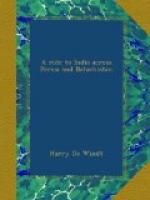Ignorance had indeed been bliss in our case, and I felt some compunction when I remembered how disdainfully we had treated the ragged sergeant and his men. They would have been of no use, except in the way of stop-gaps, like the babies, in cheap prints, that the Russian traveller in the sleigh throws to the wolves to occupy their attention while he urges on his mad career, a pistol in each hand and the reins in his mouth. Still, even for this purpose, they might have been useful, and were certainly worth a few kerans. I was glad not to learn the truth till we reached Kazeroon. The enjoyment of the meal of which we partook at the summit of the pass would have been somewhat damped by the feeling that at any moment a loud roar, bursting out of the silent fastnesses of the Kotal Doktar, might announce the approach of its grim tenant.
There was, after all, nothing very remarkable about the occurrence, for the southern parts of Persia are infested with wild animals of many kinds. Of this I was already aware, but not that lions were among the number.
Kazeroon is, next to Shiraz, the most important place in the province of Fars, and has a population of about 6000. Surrounded by fields of tobacco and maize, it is neatly laid out, and presents a cheerful appearance, the buildings being of white stone, instead of the everlasting baked mud and clay. Many of the courtyards were surrounded by date palms, and the people seemed more civilized and prosperous-looking than those in the villages north of Shiraz.
“So you refused the escort over the Kotal?” said J—that evening, as we sat over our coffee and cigars in his little stone courtyard, white and cool in the moonlight, adding, with a laugh, “Well, I don’t blame you. A good story was told me the other day in Shiraz apropos of escorts. It happened not long ago to an Englishman who was going to Bagdad from Kermanshah through a nasty bit of country. A good many robberies with violence had occurred, and the Governor of Kermanshah insisted on providing him with an escort, at the same time arranging for a Turkish escort to meet him on the frontier and take him on to Bagdad.”
“You have seen the ordinary cavalry soldier of this country. There were twelve of them and a sergeant. V—— was the only European. All went well till they reached a small hamlet near Zarna, about twenty miles from the Turkish border. It was midday. V—— was quietly breakfasting in his tent, the horses picketed, the men smoking or asleep. Suddenly the sound of firing was heard about a mile off, not sharp and loud, but slow and desultory, like the pop, pop, pop of a rifle or revolver. V—— was not in the least alarmed, but, the firing continuing for some time, he thought well at last to inquire into the matter. What was his surprise, on emerging from his tent, to find himself alone, not a trace of his companions to be seen. There were the picket-ropes, a smouldering fire, a kalyan, and the




